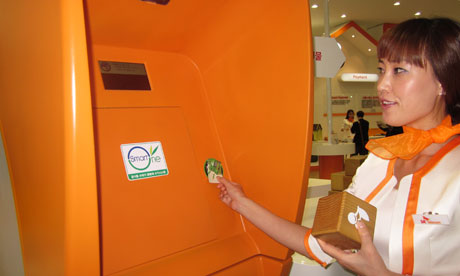
In the past decade, South Korea has increased in prominence on the global stage with its hosting of huge international events like the World Cup in 2002 and the G20 Summit in 2010. The cosmopolitan flair of its capital, Seoul, is on display in neighbourhoods like wealthy Akpujong and artsy Samcheong-dong. Living in what is currently the 13th wealthiest nation on earth, South Koreans spend and consume far more than they did a generation ago.
They are eating more, too. Seoul and Busan boast thriving restaurant scenes, and the waste from restaurants and street stalls has to go somewhere.
South Koreans have been keen on recycling for some time and have achieved impressive gains in waste diversion. People must separate their rubbish using specially marked bags they purchase for waste disposal. For the most part, the system works. The less waste that families and businesses generate, the less they have to pay. Pity the wayward apartment dweller who dares to defy rules surrounding the disposal of refuse. In a country with a high population density, the chances are high that a neighbour or an apartment security guard will report residents who do not properly sort their rubbish, or cheat by using a supermarket carrier bag to throw away their waste.
Food waste recycling through programs like composting and the ban on direct landfilling have been successful overall. Public service announcement campaigns designed to raise awareness about food waste have resonated for the most part. Despite this, South Korea continues to struggle with the problem of 171,000 tons of food waste generated every day, equating to 350 grams per person. Waste processing costs are projected to increase as rules for recycling and effective disposal are tightened even more. In a country where land is at a premium, landfill is rapidly disappearing.
South Korea will roll out a new weight-based food waste fee system. New bins, designed by SK Telecom, have been fitted with radio frequency identification (RFID) technology that will charge residents and business owners for the amount of food waste they create. The system promises to work quickly. First, users will tap a card with an RFID tag (which can also double as a public transport fare card) on a reader. The bin's disposal bin lid immediately opens, allowing the user to throw their food waste in for weighing. The lid then snaps shut, and the food waste is immediately calculated with a fee charged to the user's credit card.
According to the South Korean government, food waste disposal costs the country about 18trn won (GBP 10bn) annually. A 20% reduction in food waste could reduce those costs by 5bn won (GBP 2.8bn) and prevent the emission of 4m tons of greenhouse gasses. Most of those emissions are methane, a noxious greenhouse gas that is 20 times more potent than carbon dioxide. With countries like the United States and the United Kingdom wasting as much as 30% of their food, a system similar to the one Korea is launching should be considered to both raise awareness about the problems associated with food waste, and to offer a solution to diminishing landfill space.
Leon Kaye is founder and editor of GreenGoPost.com
This content is brought to you by Guardian Professional. Become a GSB member to get more stories like this direct to your inbox







